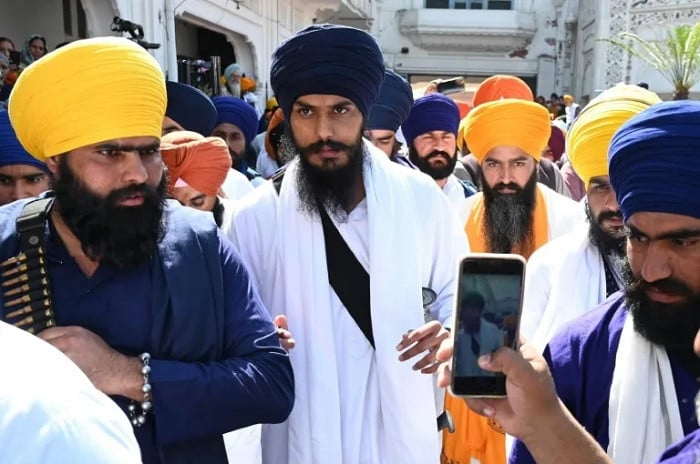To deter any jailbreak or violent rescue attempts, the New Delhi-pressured government of Indian Punjab is moving one of the most vocal pro-Khalistan activists, Amritpal Singh, to prison in the northeastern state of Assam — over 2,500 kilometres away from the state that is the heart of the Indian Sikh community.
Indian authorities fear keeping Amritpal Singh in any prison in Punjab or Haryana could prove disastrous for the law-and-order situation in the quasi-restive state, where anti-government sentiment is simmering because of the atrocities faced by the Sikh community over the years since Operation Blue Star in 1884, strengthening the Khalistan movement.
The movement aims to create a homeland for Sikhs by establishing an ethnoreligious sovereign state named Khalistan in the Punjab region.
Singh, who heads an organisation called ‘Waris Punjab De (heirs of Punjab), has been detained under India’s notorious National Security Act (NSA).
Indian police arrested him after a month-long manhunt that sparked protests and vandalism among the diaspora in Britain, Canada and the United States.
Singh rose to fame in the northern state of Punjab for calling for a separate Sikh homeland known as Khalistan, the struggle for which sparked deadly violence against Sikhs in the 1980s and 1990s.
Singh, 30, styles himself on Jarnail Singh Bhindranwale, a figurehead of the Khalistan movement killed when the Indian army stormed the Golden Temple in Amritsar, a major Sikh site, in 1984.
Known as Operation Blue Star, it was a military raid against Sikhs in the Golden Temple in which 1,000 people are estimated to have been killed.
Later that year, prime minister Indira Gandhi was assassinated by her own Sikh bodyguards, triggering a further wave of retaliation in which nearly 3,000 Sikhs were killed.
Amritpal Singh sports a similarly styled blue turban and reportedly travelled to the former Soviet Republic of Georgia last year for cosmetic surgery to look more like his hero.
Authorities have also put around nine of Singh’s followers in Dibrugarh jail, where they are kept separately.
They have been held in different cells to avoid the probability of Singh and his aides radicalising other prisoners in jail and associating them with a militant group, Anandpur Khalsa Fauj (AKF).
According to The Hindu, the 1980 Act allows authorities to hold Singh for a year through executive orders, which could also be extended. Singh, wanted in at least six other criminal cases was detained under NSA.
The NSA has the provision to shift the detainee from “one place of detention to another, within the same State or in another State, by order of the appropriate government”. The publication also quoted an official saying that arresting Singh under any other criminal case would have required the court’s permission.
“The possibility of a law-and-order situation in Punjab had Singh been kept in a jail in the State could not be ruled out. They could have incited other prisoners and could have planned a jailbreak,” The Hindu quoted the official as saying.
“There are groups in Punjab funded by international separatist organisations who could have organised protests in his support outside the jail premises,” said the official.
Singh had been in hiding since March 18, 2023, in Punjab and nearby areas.
According to media reports, agencies had been hot on Singh’s trail since last year; however, he came out on February 23, after he led a protest demonstration outside a police station in Punjab’s Ajnala demanding the release of a Sikh activist detained by police unlawfully.
Police said they arrested Singh on April 23 around 6:45am (0115 GMT), having surrounded a village following intelligence that he was there in a gurdwara, or Sikh temple.
“Once he got the message that he had no escape route and he was surrounded, he was arrested,” senior police official Sukhchain Singh Gill told reporters.
Media reported that the protestors used a copy of Guru Granth Sahib, the holy book of the Sikhs, to deter police from resorting to violence.

